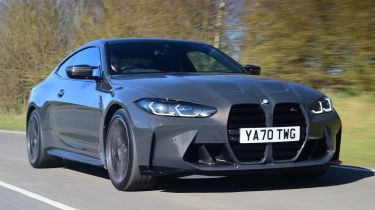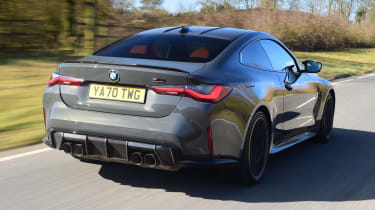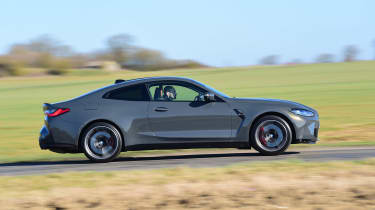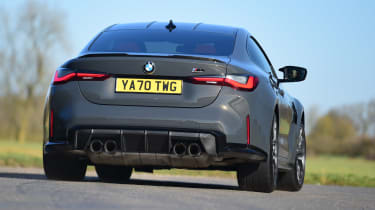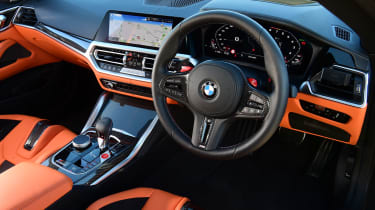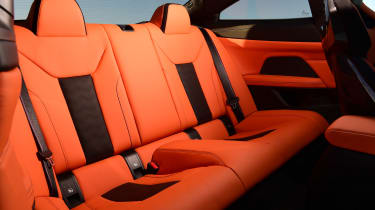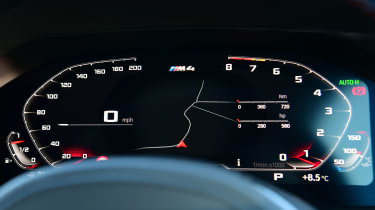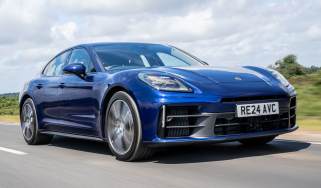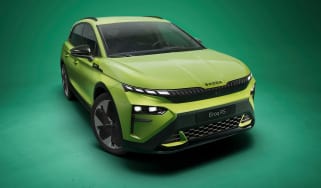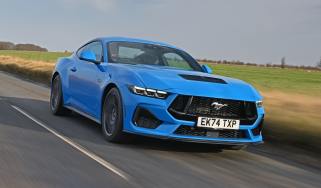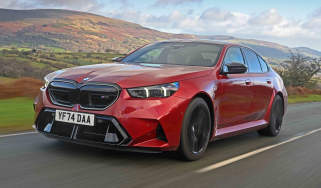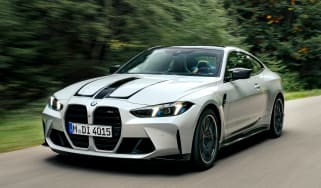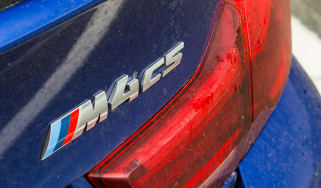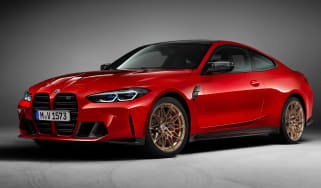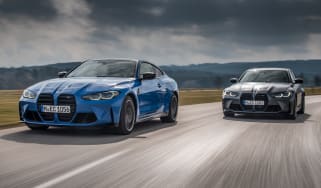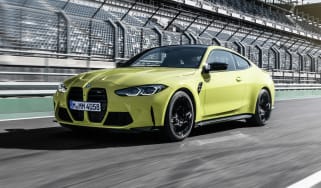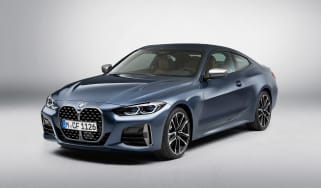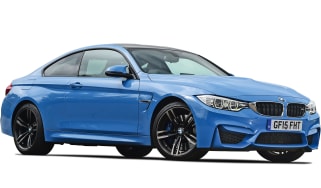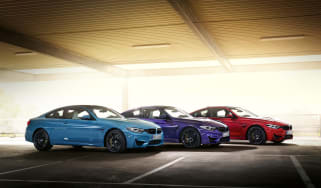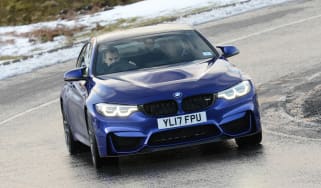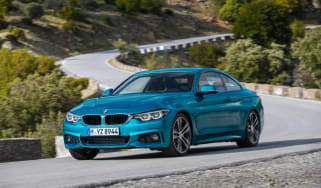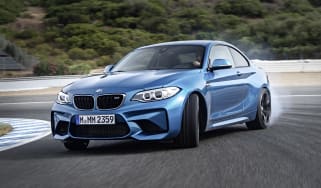BMW M4 Coupe review
"The styling might divide opinion but there’s nothing polarising about the way the BMW M4 performs"
Pros
- Superb handling
- Potent engine
- Practical for the class
Cons
- Heavy
- Polarising design
- Tight rear headroom
Verdict - is the BMW M4 a good car?
A new generation of BMW M3 and BMW M4 is a momentous occasion for keen drivers, as each new model adds to a lineage that includes some of the most exciting and complete performance cars ever offered to enthusiasts. Yet when the latest M3 and M4 were launched, there was much more talk about its styling than its performance or handling. Fortunately, it’s not a case of all mouth and no trousers. The latest BMW M4 is still up there with the very best sports cars, thanks to its involving driving experience and mountainous power output.
BMW M4 models, specs and alternatives
 The top 10 best sports cars in 2025
The top 10 best sports cars in 2025
The BMW M4 Competition is one of the most serious performance models in the manufacturer's range, sitting above the BMW M2 and beneath the bigger, but arguably less focused, BMW M5. The M4 is also available in Convertible form, and if you'd prefer a pair of extra doors, the BMW M3 saloon shares most of the M4 Competition's hardware. BMW has also recently added an M3 Touring estate for those who wish to carry more things very quickly indeed. Other markets are offered the less powerful, non-Competition spec M4, but UK buyers are limited to the M4 Competition only.
In 2022, the BMW M4 CSL joined the range to celebrate the M division’s 50th anniversary. With carbon-fibre body panels, just the two seats and 542bhp, the M4 CSL is a serious performance car. CSL stands for ‘Competition, Sport, Lightweight’ and has previously represented the pinnacle of BMW M3 models. You’ll be lucky to see one – just 100 were brought to the UK at a cost of £130,0000 each.
More reviews
In early 2024, the M4 was treated to a mid-life facelift. This brought a handful of changes inside and out, plus some engine software tinkering to release an extra 20bhp. You’ll recognise the facelifted M4 by its new headlights and tail-lights – the latter lifted from the CSL – but the biggest change was the discontinuation of the rear-wheel drive model.
If you missed the chance to get your hands on one of the 100 M4 CSLs, BMW introduced the M4 CS in May 2024. Designed to sit between the standard M4 and the CSL, the CS caters to track-driving enthusiasts, with another 20bhp, a retuned suspension setup, and a smattering of extra exterior carbon-fibre. The M Driver’s package is fitted as standard – raising the top speed to 180mph – along with M Carbon bucket seats, lightweight wheels and a titanium exhaust silencer.
The standard M4 faces off against some talented rivals, including the Mercedes-AMG C63 S and Audi RS5 from Germany, and the Italian Alfa Romeo Giulia Quadrifoglio, which prospective M4 buyers may rightfully be tempted by, despite it being a saloon. A Tesla Model 3 Performance could be another saloon-shaped alternative if petrol power isn’t a prerequisite, while the V8-engined Lexus LC 500 appeals for its looks and engine noise. Don’t overlook the Porsche 911 either – it starts at a higher price, but with a few options the M4 can easily overlap with the base Carrera and Carrera 4.
Much of the buzz around the latest M4 has been around its polarising looks because, in keeping with BMW's latest design direction, it features a significantly larger interpretation of the traditional kidney grilles. It's up to buyers to decide if they approve or not but it's also worth noting the M4 is available in Black Sapphire metallic at no extra cost, which makes the nose much more subdued than Sao Paulo Yellow. Naysayers are also far less likely to have an issue with how the M4 looks from the sides or rear, which are sleek and far less controversial. You may also think the pumped-up M4 suits its grilles better than the regular BMW 4 Series on which it’s based.
More importantly, though, the M4 really hits the spot when you get behind the wheel. The chassis is balanced and communicative, something you couldn’t always say about its predecessor, yet in the gentler driving modes it’s surprisingly laid-back. Of course, its 523bhp twin-turbo 3.0-litre petrol engine can still serve up devastating acceleration, getting the 1,700kg M4 from 0-62mph in under four seconds.
The discontinued rear-wheel drive model could struggle to put down all that power, but the now standard-fit xDrive four-wheel drive system makes the M4’s performance more accessible. Plus, the extra traction adds a feeling of security in poor weather. The M4 Competition xDrive is also quicker than the rear-drive car, taking just 3.5 seconds to complete the 0-62mph sprint.
Stick with one of the more conservative colour schemes and the interior feels fairly grown up, aside from the bright red driving mode buttons and engine push start. The large pair of curved displays dominate proceedings, and the software is clear and easy to use. Beware of the option packs, though, which are tempting but seriously push up the price. Unless you attend lots of track days, the circa £15,000 BMW asks for the M Race Track Pack – which includes a set of ceramic brakes, carbon-fibre bucket seats and a 180mph top speed – won’t be necessary.
MPG, running costs & CO2
Nobody is likely to buy a BMW M4 to cut down on their motoring bills but that doesn't mean BMW's engineers can adopt an 'anything goes' ethos. Indeed, the M4 has been affected by the downsizing trend; it’s now fitted with a 3.0-litre six-cylinder petrol engine with two turbochargers, where a decade ago you’d have found a 4.0-litre naturally aspirated V8. It also features fuel-saving measures like stop and start to cut power while waiting in traffic.
This adds up to a car capable of 28.0mpg, while CO2 emissions from 227g/km place it firmly in the top 37% Benefit-in-Kind (BiK) band for company car drivers. You'll need to drive gently to get close to this fuel economy figure in the real world. This compares well to the Alfa Romeo Giulia Quadrifoglio (with 27.2mpg), while it's just behind the Mercedes-AMG C63 with an official figure of 32.8mpg. Drive more how you might when enjoying the M4's performance and we found around 18mpg is more realistic.
Of course, running costs will be substantially higher than for a standard model, with performance tyres, brakes and other consumables all more expensive than standard parts. The M4 also sits in a high insurance group, so it's worth shopping around for quotes before placing an order.
That’s on top of the initial price, which is significantly more expensive than the previous M4’s launch price. Tick enough option boxes and this is a car that can easily cost over £100,000. Road tax costs £600 per year until the car is six years old.
Engines, drive & performance
We haven't sampled the latest BMW M4 on a track yet but on the road it's seriously impressive. For a start, when you don't want it to be a shouty performance monster, the M4 is surprisingly relaxed. In fact, it's no more tiring or difficult to drive than a 420d, making it feel more mature than its predecessor. Despite having a firm ride, the suspension is well-judged enough to round off most of a road's sharpest edges.
Of course, the M4 also has a wild side but thanks to myriad options to adjust the engine, gearbox, steering weight and electronic safety net, you can tune the M4 to feel exactly how you want. Dial it up to Sport or Sport Plus and the M4 still doesn't feel completely intimidating because the balanced chassis and controls keep you informed with exactly what the car is doing. The steering even conveys how much grip the front tyres have, which hasn't always been the case with recent fast BMWs. Get too audacious with the throttle, though, and you'll be able to feel the rear of the car shimmy through the driver's seat.
It goes without saying that with 503bhp and 650Nm of pulling power, the pre-facelift M4 Competition (we don't get the less powerful non-Competition version in the UK) is seriously rapid, getting from 0-62mph in 3.9 seconds. The rear-wheel-drive version is exciting enough but there is also a four-wheel-drive model that uses BMW's xDrive technology. Not only does this version add extra traction in wet conditions, but it enables an even quicker acceleration time too, covering the 0-62mph measure in 3.5 seconds. The engine really comes alive at 3,000rpm, when the turbos are blowing at full strength and the M4 hurtles towards the horizon, with fast shifts from its eight-speed automatic gearbox.
The 2024 facelifted BMW M4 brought an additional 20bhp – bringing the total to 523bhp – but the rear-wheel drive model was ditched in favour of the xDrive variant. It’s a decision that’s unlikely to deter many customers, as drivers can switch the four-wheel drive system to rear-wheel drive mode through the touchscreen. As before, the M4 is only available in Competition trim with the eight-speed automatic gearbox.
Interior & comfort
The M4's interior is shared with the BMW M3 and, to a large extent, the standard 3 and 4 Series. If you get trigger happy with the options list, however, it's possible to spec some truly lurid interior colour combinations that aren't likely to suit everyone. Grey and black might be a better bet to ensure resale values are as high as possible.
Exclusive details include an M steering wheel with red buttons for driving mode selection, Merino leather sports seats and carbon fibre trim inlays. Carbon fibre bucket seats are also offered, saving 10kg of weight versus the standard items; they’re expensive at over £4,000, but are extremely supportive (provided you can live with the unusual carbon hump between your thighs) and look very theatrical.
Early cars came fitted with a 10.25-inch infotainment touchscreen and a separate 12.3-inch digital instrument display, but from 2022 onwards, all M4s use BMW’s floating curved display. The system runs the latest version of BMW iDrive and consists of a 12.3-inch display behind the steering wheel for the driver, along with a 14.9-inch central infotainment touchscreen.
Standard equipment includes two-zone climate control, wireless smartphone charging and heated front seats. There are several option packs to choose from, including the £3,000 Technology Pack that brings adaptive LED headlights, keyless access (that can also be used with a digital key on a compatible Apple smartphone) and an electric boot lid. If you plan to take your M4 on track, the M Race Track Pack brings carbon-ceramic brakes, carbon-fibre bucket seats, plus carbon-fibre interior trim and a raised top-speed limit. You’ll need to be very committed to performance driving though, as the Track Pack costs over £15,000.
Practicality & boot space
Driving enthusiasts are likely to cross-shop the BMW M4 Competition with entry-level versions of the Porsche 911, and practicality could be one reason to pick the M4. While it takes a while for the front seats to slide out of the way, once they do, there's more legroom in the back of the M4 than not only the Porsche but also an Audi RS5. Headroom isn't quite as impressive, though, with anyone close to six-feet tall likely to find their head brushing the headlining. The M4 only has room for two in the back.
Boot space is also unchanged for the M4 version, so buyers will get the same 440 litres of luggage room as a regular petrol or diesel 4 Series. This is quite a bit more than the 355-litre boot in the Mercedes-AMG C63 but the Alfa Romeo Giulia Quadrifoglio is even better, managing 480 litres.
Reliability & safety
The BMW 4 Series, on which the M4 is based, hasn’t yet appeared in our Driver Power customer satisfaction survey, but the four-door 3 Series managed a 46th-place finish from 75 cars in the 2023 survey – a long way behind the 13th-placed BMW i3, but the highest finish of the company’s conventional models.
BMW itself finished 21st from 32 brands, so neither could be described as a stellar performance, though its German rivals Mercedes and Audi were even further down the table in 25th and 30th place. In theory, the M4 should be even more thoroughly engineered than the standard model because its designers will have ensured it’s strong enough to cope with the extra power and cornering forces.
It's unlikely the M4 will be crash-tested by Euro NCAP owing to its relatively small sales volumes but the closely related BMW 3 Series has already been awarded the full five stars for safety. This included an impressive 97% for adult occupant protection. Standard safety equipment includes autonomous emergency braking, lane departure warning and speed limit information. There's also an optional Drive Recorder, which can record video using the car's cameras in the event of a collision.
